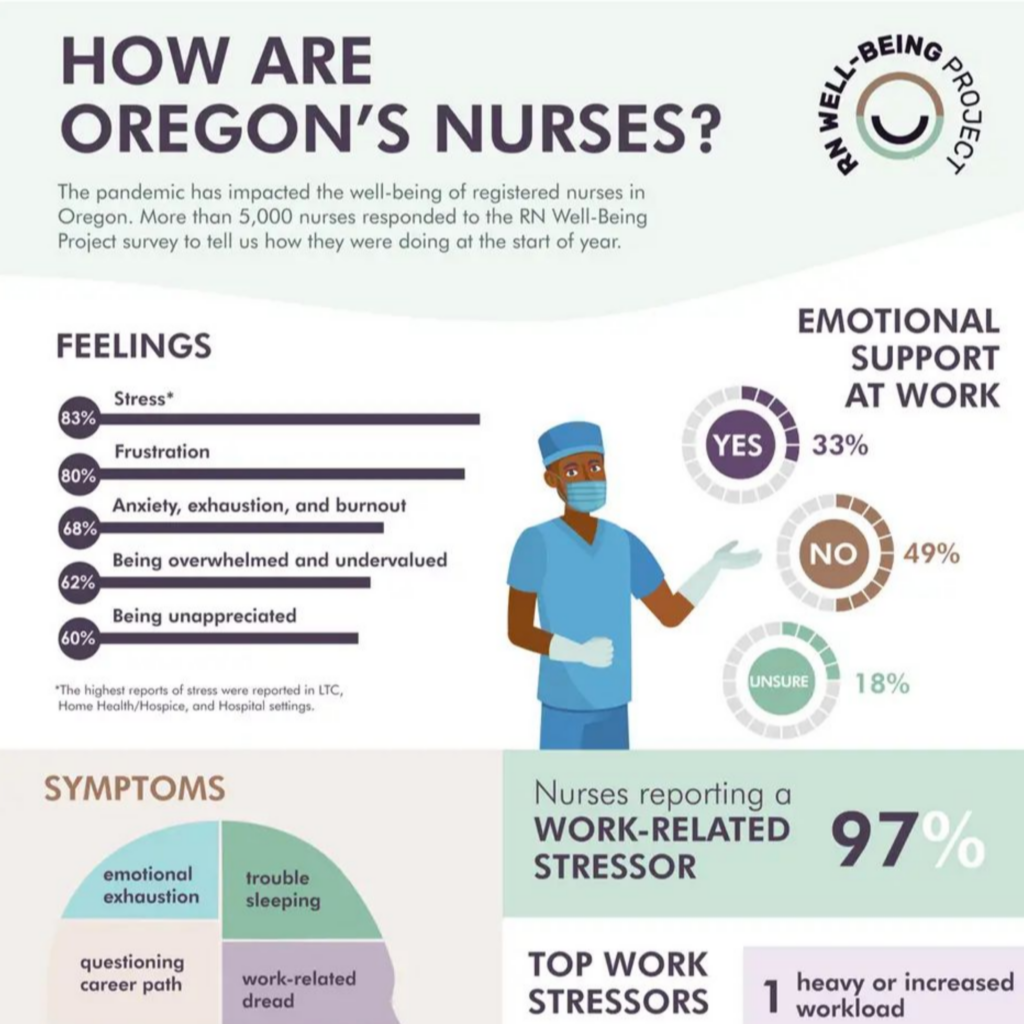A Data-Driven, Nurse-Led Approach
Understanding the root causes of nurse burnout and exploring evidence-based interventions
What Have We Learned?
First, Oregon’s nurses are under tremendous stress, as demonstrated by the key findings from a 5,000+ response survey conducted with the Oregon State Board of Nursing in 2022:
of nurses reported experiencing at least one workplace stressor
of nurses reported feeling frustration at work
of nurses reported anxiety, exhaustion, and burnout
Second, not all workplace stressors are the same, and not all stressors can be solved through self-care or resilience training. This insight shifted the project’s trajectory—from a narrow focus on burnout to a broader, more accurate framework for addressing both workplace harm and emotional strain.
Third, there’s a gap between how employers perceive the support they offer and how nurses perceive it. In a recent study of the healthcare sector, 71% of employers reported that employee mental health is supported well or very well; however, just 27% of the employees surveyed agreed.
Dive Deeper into Nurse and Employer Perceptions
Related OCN Research Reports
In addition to the RN Well-Being Project, the Oregon Center for Nursing has developed a series of workforce research reports that explore key issues shaping nurse retention, practice environments, and emotional health. While these white papers are not direct outputs of the RNWB Project, they complement and deepen the understanding of the systemic challenges this work addresses. These reports offer valuable insights for healthcare leaders, educators, and policymakers seeking to strengthen Oregon’s nursing workforce. For a full archive of OCN’s workforce research, visit our main research page.

Oregon’s Nurse Vacancy Crisis: 2024 Brief
(Published 2024)
Analyzes how staffing shortages, burnout, and transition challenges undermine nurse retention, strain clinical training systems, and jeopardize long-term workforce stability across Oregon’s care settings.

RN Well-Being Survey Snapshot: 2022 Infographic
(Published 2022)
Presents key findings from over 5,000 Oregon RNs, including emotional health indicators, workplace support, and retention factors, in a visual one-page format.

The Future of Oregon’s Nursing Workforce: Analysis and Recommendations
(Published 2022)
A system-level analysis of Oregon’s nursing workforce, with insights on retention, education, and practice environments that influence long-term workforce sustainability.

Issues Facing the Post-Pandemic Nursing Workforce 3:3 in Series
(Published 2022)
Explores how shifts in workplace expectations, emotional demands, and organizational culture are contributing to stress and shaping the evolving experience of nurses in Oregon.

A New View on Nurse Turnover: How the Pandemic Shocked the System
(Published 2021)
Analyzes how systemic disruptions have influenced nurse turnover in Oregon, with attention to shifting job expectations, professional alignment, and organizational support.

Issues Facing the Post-Pandemic Nursing Workforce in Oregon 2:3 in Series
(Published 2021)
Examines the sources of psychological stress among nurses in Oregon and considers how organizational environments affect emotional resilience and professional sustainability.

Clinical Placement for Nursing Students in an Era of Pandemic
(Published 2021)
Highlights how placement disruptions, strained partnerships, and unclear coordination led to widespread stress among faculty, students, and staff—revealing systemic barriers to workforce readiness.

Issues Facing the Post-Pandemic Nursing Workforce in Oregon 1:3 in Series
(Published 2020)
Identifies key challenges affecting Oregon’s nursing workforce, including emotional strain, role changes, and organizational pressures that contribute to long-term workplace stress.

Coming Soon: New Research from OCN
(Published Year-Round)
OCN regularly releases new studies, briefs, and infographics that explore workforce dynamics, emerging trends, and system-level challenges impacting Oregon’s nursing profession.

